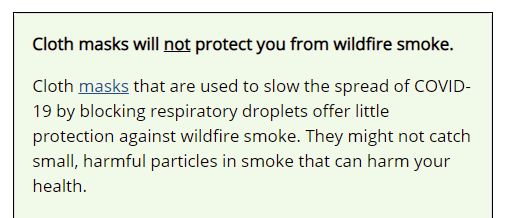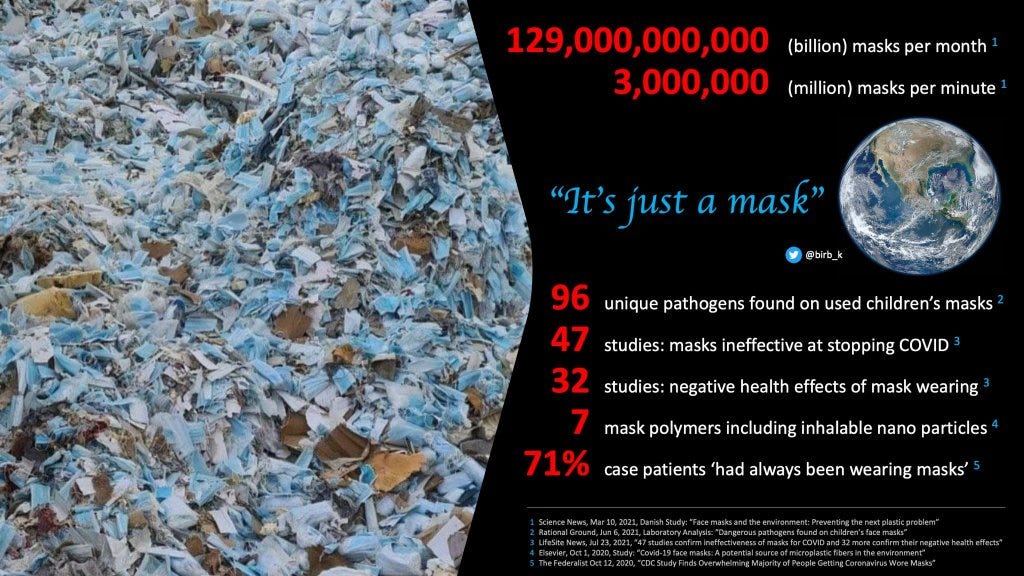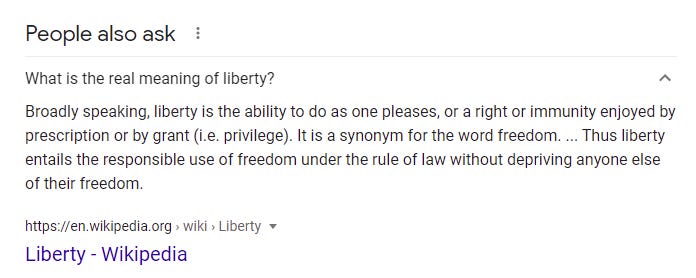[AM editor’s note: the following includes an article written by the authors of the “Danish study” on facemask wearing; the study itself; a BMJ article commenting on the manipulation of the authors findings by the journal that published the study. It is preceded by some commentary by Steve Kirsch a Silicon Valley entrepreneur and philanthropist].
Do masks work?
Steve Kirsch | 8 Nov 2021
No possible way says filtration expert Tyson Gabriel. He’d bet the farm on it. I would too. Will anyone bet against me?
Tyson Gabriel is the industrial hygienist that made this 1 hour video on mask wearing entitled “Just wear a mask or you’ll kill Grandma.” It’s in 6 parts, but all 6 parts are in the 1 hour video. It’s entertaining to watch.

The bottom line is Fauci was sort of right when he was originally asked about masks and he replied they are “useless, but if it makes you feel better, you can wear them.”
They are actually detrimental, especially for kids, because they trap bacteria and you then breath in that bacteria resulting in an increase in respiratory infections.
I inspired Tyson to make THE definitive video on showing the world that mask wearing is completely useless. He expects to have it done after Thanksgiving.
Until then, just remember that the CDC says masks don’t work for wildfire smoke and the virus is 25X smaller than a smoke particle. So it’s like trying to stop a mosquito with a chain link fence.

There are a lot of mask studies, but they are all confounded. There isn’t a good masking study funded by the CDC since they know they don’t work.
And the Danish mask study that was well done, showed masks didn’t work. The journal the researchers submitted it to said if they wanted it published, the authors would have to come to a conclusion that masks worked. So they re-wrote the paper so masks worked, and what do you know… it got published.
You can’t make this stuff up! Want proof? Read this article published in the BMJ which did a superb job of documenting how scientific journals dictate the scientific outcomes they want to see.
This article “The Face Mask Folly in Retrospect” is excellent. It talks about 12 myths. It even shows that N95 masking does not work. It dispels all the popular myths. If you aren’t already convinced, then check out that article.

In short, today we adjust the science to match what the CDC says, it’s not the other way around like in the old days. Get it? In the Biden era, the narrative drives the science.
In other words, once again the CDC advice is terrible and it is harming people. People obey the CDC advice without questioning the science. It’s total mind control. The worst advice is not telling people about ivermectin and fluvoxamine.
Back to masks. It seems that nobody will have a scientific debate with Tyson. Nobody. That’s how confident they are in their advice: they are sure they would lose.
If there is anyone who wants to debate Tyson on mask wearing, please indicate this in the comments below. It will be fun to watch. Thanks.
In the meantime, remember, cloth and surgical masks are useless. They don’t stop COVID at all. It’s all political theater. You are basically showing your blind obedience government that, if they ask you to, you will do nonsensical things that harm your health.
There used to be a time in the US when we were entitled to liberty which is the ability to do what you want so long as you don’t deprive anyone else of their freedom. Those days are gone.

Mandating mask wearing is therefore both unconstitutional and stupid. But everyone is so brainwashed that nobody is challenging the mandate.
I highly recommend reading the comments for other studies. This video works well too:https://www.youtube-nocookie.com/embed/il-5HVmmMXE?rel=0&autoplay=0&showinfo=0&enablejsapi=0
Select reader comments
The inefficacy of mask mandates has been known for at least ten years.
Studies on masking in containing influenza like illnesses from 2007-2009 showed that masks have little actual benefit. See this article.
Which makes the CDC position on masking downright insane.
Our research team (epidemiologist, microbiologist and I, a naturopathic physician) compiled the largest body of research in English on the hazards of masks. Those peer-reviewed studies are at
https://PDMJ.org, vol 1. The gist of what is known is that respiratory droplets are relatively large, heavy and fall quickly in front of you. The mesh of masks on the other hand aerosolize those droplets. Now those light airborne viral particles travel farther, 18 to 20 feet, and linger longer in the air. Most of that was the Duke University research we cited. But also unfiltered exhaled air shot by nozzle effect out of masks’ side jets go several meters. Because a masked person incubates 100,000 bacterial colonies per hour average, you don’t want to stand or sit next to those bacteria-laden side jets of a masked person.
Masked populations have shown higher rates of COVID than unmasked – county comparisons in US, thanks to Ian Miller. I write about that in 4th paper in above series. The above is my best understanding to date for why masks are neither effective nor safe.
Ian Miller is on Substack. His charts on Twitter showing higher rates of COVID “cases,” hospitalizations and deaths in masked counties vs unmasked, (ditto states and nations) have been widely cited.
Landmark Danish study finds no significant effect for facemask wearers
The Spectator | 19 Nov 2021
Do face masks work? Earlier this year, the UK government decided that masks could play a significant role in stopping Covid-19 and made masks mandatory in a number of public places. But are these policies backed by the scientific evidence?
Yesterday marked the publication of a long-delayed trial in Denmark which hopes to answer that very question. The ‘Danmask-19 trial’ was conducted in the spring with over 6,000 participants, when the public were not being told to wear masks but other public health measures were in place. Unlike other studies looking at masks, the Danmask study was a randomised controlled trial – making it the highest quality scientific evidence.
Around half of those in the trial received 50 disposable surgical face masks, which they were told to change after eight hours of use. After one month, the trial participants were tested using both PCR, antibody and lateral flow tests and compared with the trial participants who did not wear a mask.Randomised trials are important if we want to understand the impact of measures like face masks
In the end, there was no statistically significant difference between those who wore masks and those who did not when it came to being infected by Covid-19. 1.8 per cent of those wearing masks caught Covid, compared to 2.1 per cent of the control group. As a result, it seems that any effect masks have on preventing the spread of the disease in the community is small.
Some people, of course, did not wear their masks properly. Only 46 per cent of those wearing masks in the trial said they had completely adhered to the rules. But even if you only look at people who wore masks ‘exactly as instructed’, this did not make any difference to the results: 2 per cent of this group were also infected.
When it comes to masks, it appears there is still little good evidence they prevent the spread of airborne diseases. The results of the Danmask-19 trial mirror other reviews into influenza-like illnesses. Nine other trials looking at the efficacy of masks (two looking at healthcare workers and seven at community transmission) have found that masks make little or no difference to whether you get influenza or not.
But overall, there is a troubling lack of robust evidence on face masks and Covid-19. There have only been three community trials during the current pandemic comparing the use of masks with various alternatives – one in Guinea-Bissau, one in India and this latest trial in Denmark. The low number of studies into the effect different interventions have on the spread of Covid-19 – a subject of global importance – suggests there is a total lack of interest from governments in pursuing evidence-based medicine. And this starkly contrasts with the huge sums they have spent on ‘boutique relations’ consultants advising the government.
The only studies which have shown masks to be effective at stopping airborne diseases have been ‘observational’ – which observe the people who ordinarily use masks, rather than attempting to create a randomised control group. These trials include six studies carried out in the Far East during the SARS CoV-1 outbreak of 2003, which showed that masks can work, especially when they are used by healthcare workers and patients alongside hand-washing.
But observational studies are prone to recall bias: in the heat of a pandemic, not very many people will recall if and when they used masks and at what distance they kept from others. The lack of random allocation of masks can also ‘confound’ the results and might not account for seasonal effects. A recent observational study paper had to be withdrawn because the reported fall in infection rates over the summer was reverted when the seasonal effect took hold and rates went back up.
This is why large, randomised trials like this most recent Danish study are so important if we want to understand the impact of measures like face masks. Many people have argued that it is too difficult to wait for randomised trials – but Danmask-19 has shown that these kind of studies are more than feasible.
And now that we have properly rigorous scientific research we can rely on, the evidence shows that wearing masks in the community does not significantly reduce the rates of infection.
Due to the large number of people passing comment on the article on social media without reading it, we have updated the headline to emphasise that the study is about facemask wearers. Covid data can be found on our data hub: data.spectator.co.uk
WRITTEN BYCarl Heneghan & Tom Jefferson
Carl Heneghan is professor of evidence-based medicine at the University of Oxford and director of the Centre for Evidence-Based Medicine Tom Jefferson is a senior associate tutor and honorary research fellow at the Centre for Evidence-Based Medicine, University of Oxford
Effectiveness of Adding a Mask Recommendation to Other Public Health Measures to Prevent SARS-CoV-2 Infection in Danish Mask Wearers
Annals of Internal Medicine | March 2021
A Randomized Controlled TrialHenning Bundgaard, DMSc, Johan Skov Bundgaard, BSc, … See More
Author, Article and Disclosure Informationhttps://doi.org/10.7326/M20-6817
Eligible for CME Point-of-Care
Background:
Observational evidence suggests that mask wearing mitigates transmission of severe acute respiratory syndrome coronavirus 2 (SARS-CoV-2). It is uncertain if this observed association arises through protection of uninfected wearers (protective effect), via reduced transmission from infected mask wearers (source control), or both.
Objective:
To assess whether recommending surgical mask use outside the home reduces wearers’ risk for SARS-CoV-2 infection in a setting where masks were uncommon and not among recommended public health measures.
Design:
Randomized controlled trial (DANMASK-19 [Danish Study to Assess Face Masks for the Protection Against COVID-19 Infection]). (ClinicalTrials.gov: NCT04337541)
Setting:
Denmark, April and May 2020.
Participants:
Adults spending more than 3 hours per day outside the home without occupational mask use.
Intervention:
Encouragement to follow social distancing measures for coronavirus disease 2019, plus either no mask recommendation or a recommendation to wear a mask when outside the home among other persons together with a supply of 50 surgical masks and instructions for proper use.
Measurements:
The primary outcome was SARS-CoV-2 infection in the mask wearer at 1 month by antibody testing, polymerase chain reaction (PCR), or hospital diagnosis. The secondary outcome was PCR positivity for other respiratory viruses.
Results:
A total of 3030 participants were randomly assigned to the recommendation to wear masks, and 2994 were assigned to control; 4862 completed the study. Infection with SARS-CoV-2 occurred in 42 participants recommended masks (1.8%) and 53 control participants (2.1%). The between-group difference was −0.3 percentage point (95% CI, −1.2 to 0.4 percentage point; P = 0.38) (odds ratio, 0.82 [CI, 0.54 to 1.23]; P = 0.33). Multiple imputation accounting for loss to follow-up yielded similar results. Although the difference observed was not statistically significant, the 95% CIs are compatible with a 46% reduction to a 23% increase in infection.
Limitation:
Inconclusive results, missing data, variable adherence, patient-reported findings on home tests, no blinding, and no assessment of whether masks could decrease disease transmission from mask wearers to others.
Conclusion:
The recommendation to wear surgical masks to supplement other public health measures did not reduce the SARS-CoV-2 infection rate among wearers by more than 50% in a community with modest infection rates, some degree of social distancing, and uncommon general mask use. The data were compatible with lesser degrees of self-protection.
Primary Funding Source:
The Salling Foundations.
The curious case of the Danish mask study
BMJ | 26 Nov 2020
BMJ 2020; 371 doi: https://doi.org/10.1136/bmj.m4586 (Published 26 November 2020)
Cite this as: BMJ 2020;371:m4586
Editor’s Choice
DANMASK-19, the first trial of mask use during covid-19, was “negative.” Masks didn’t work. We knew this before the trial was published because we were told so on social media. The authors were reported by the media to be struggling to find a major journal for their trial.1 Journals weren’t proving brave enough to publish the study, said the authors, and they didn’t make a preprint available.
When the mythical trial was finally published last week in the Annals of Internal Medicine we didn’t need to read it. We already knew its damning verdict on mask wearing. Social media told us as much. Eminent professors of evidence based medicine, Carl Heneghan and Tom Jefferson, confirmed this in an article for the Spectator.2
Except that if you read the published paper you find almost the exact opposite.345 The trial is inconclusive rather than negative, and it points to a likely benefit of mask wearing to the wearer—it did not examine the wider potential benefit of reduced spread of infection to others—and this even in a population where mask wearing isn’t mandatory and prevalence of infection is low. This finding is in keeping with summaries of evidence from Cochrane.
A disagreement among experts, especially about interpretation of a study, is a common occurrence. It is the usual business of science. Only, Facebook didn’t see it that way. The social media platform that allows statements about injecting bleach to prevent covid-19, as well as calls to behead the leading US expert on pandemics,67 decreed that Heneghan and Jefferson should be censured for misinformation after they reposted their Spectator article on the site.
It is possible to disagree with Heneghan and Jefferson about the robustness and interpretation of the DANMASK-19 trial—which I do—and still believe it is wrong that their opinion of it was marked as “false information.”8 It seems 2020 is Orwell’s 1984, where the boundaries of public discourse are governed by multibillion dollar corporations (in place of a totalitarian regime) and secret algorithms coded by unidentified employees. Where is Facebook’s accountability for the lies and damaging misinformation910 that it has peddled on controversial topics such as mental health and suicides,11 minorities,12 and vaccines1314?
The problem is less that Facebook and other social media decide what is published on their platforms,15 just as The BMJ’s editors decide what is published on bmj.com. Sacha Baron Cohen and Carole Cadwalladr, among others, have argued that this is exactly what these tech giants should do.1617 It is more that Facebook in particular purports to allow freedom of speech on its platform but acts selectively, seemingly without logic, consistency, or transparency. That is how control of facts and opinions furthers hidden agendas and manipulates the public.
You might expect a national body like Public Health England to offer the best advice on mask wearing, but PHE is no more after seven years of controversy.18 Its proximity to government and industry, together with funding cuts to local authorities, essentially set it up to fail and now to become the government’s fall guy for a flawed pandemic response. PHE is being replaced by a national institute for health protection, which may well be closer still to government and industry. When accountable national organisations move in the direction of political and commercial interests, public trust is eroded, and the power of unaccountable and self-serving social media platforms only grows.
This article is made freely available for use in accordance with BMJ’s website terms and conditions for the duration of the covid-19 pandemic or until otherwise determined by BMJ. You may use, download and print the article for any lawful, non-commercial purpose (including text and data mining) provided that all copyright notices and trade marks are retained.https://bmj.com/coronavirus/usage
References
- ↵Why won’t anyone publish the Danish mask study? 17 Nov 2020. https://worldhealth.net/news/why-wont-anyone-publish-danish-mask-study.
- ↵
- Heneghan C,
- Jefferson T
- ↵Alex Nowbar’s research reviews—28 November 2020. https://blogs.bmj.com/bmj/category/weekly-research-reviews.
- ↵Brophy JM. Covid-19: controversial trial may actually show that masks protect the wearer. BMJ Opinion. 24 Nov 2020. https://blogs.bmj.com/bmj/2020/11/24/covid-19-controversial-trial-may-actually-show-that-masks-protect-the-wearer.
- ↵
- Bundgaard H,
- Bundgaard JS,
- Raaschou-Pedersen DET,
- et al
- ↵https://www.nytimes.com/2020/04/30/technology/trump-coronavirus-social-media.html.
- ↵Smith A. Facebook: Steve Bannon’s call for Anthony Fauci to be beheaded do not break its rules, Zuckerberg says. Independent. 13 Nov 2020. https://www.independent.co.uk/life-style/gadgets-and-tech/steve-bannon-anthony-fauci-behead-zuckerberg-facebook-b1722335.html.
- ↵Heneghan C. Twitter. 20 Nov 2020. https://twitter.com/carlheneghan/status/1329861848573861888.
- ↵
- Morgan M
- ↵
- Salisbury H
- ↵
- John A,
- Pirkis J,
- Gunnell D,
- Appleby L,
- Morrissey J
- ↵
- Khunti K,
- Routen A,
- Pareek M,
- Treweek S,
- Platt L
- ↵
- Will AJ
- ↵
- Mahase E
- ↵
- Oliver D
- ↵Baron Cohen S. Read Sacha Baron Cohen’s scathing attack on Facebook in full: “greatest propaganda machine in history.” Guardian. 22 Nov 2019. https://www.theguardian.com/technology/2019/nov/22/sacha-baron-cohen-facebook-propaganda.
- ↵Cadwalladr C. If you’re not terrified about Facebook, you haven’t been paying attention. Guardian. 26 Jul 2020. https://www.theguardian.com/commentisfree/2020/jul/26/with-facebook-we-are-already-through-the-looking-glass
- ↵
- Vize R


